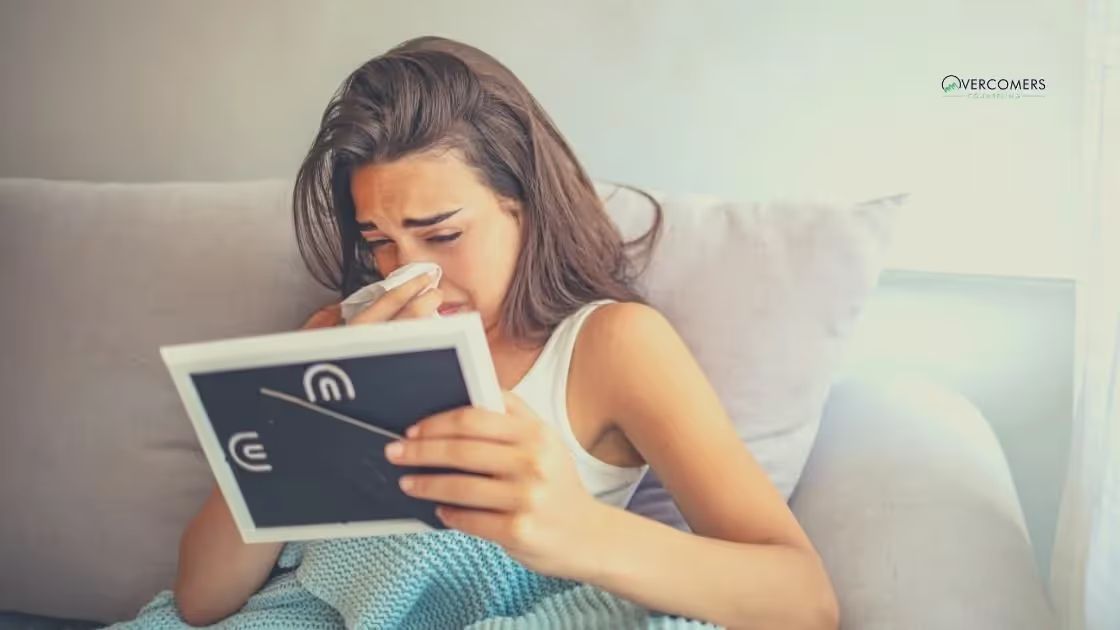Understand What's HappeningFirst, it's important to understand what's happening in your body and why you're feeling anxious.When you go through a breakup,...

First, it's important to understand what's happening in your body and why you're feeling anxious.
When you go through a breakup, your brain is releasing all sorts of hormones and neurotransmitters in response to the stress of the situation.
These include cortisol, adrenaline, and norepinephrine, all of which are responsible for the "fight or flight" response.
This is your body's natural way of preparing to deal with a crisis, and while it may help you in certain situations, it can also make dealing with an emotional event like a breakup much more difficult.

When you are going through a difficult breakup, it can be hard to know how to handle your emotions effectively.
One of the most important things to remember is that in order to overcome anxiety after a breakup, you need to allow yourself time and space to heal.
This may mean taking some time off work or social engagements while you focus on getting back on your feet.
It may also involve sticking to a regular exercise routine or practicing self-care activities like taking long walks, meditating, or journaling.
The key is not to rush yourself through the healing process but rather to go at your own pace and listen to what your body and mind need in order to recover from this difficult time.
With patience and perseverance, you will eventually find yourself stronger and more resilient than ever before.
This is an important part thing to consider when learning how to get rid of anxiety after a breakup.
When it comes to recovering from a breakup, there is no easy or one-size-fits-all solution.
Some people may find it helpful to take breaks from social situations, while others may benefit from seeking counseling or engaging in physical activity.
One thing that should be avoided, however, is bottling up your feelings and trying to soldier through the pain on your own.
That tends to only exacerbate the problem and make the recovery process that much more difficult.
Instead, when you are learning how to get rid of anxiety after a breakup, you should focus on being honest with yourself about how you feel and taking active steps toward healing.
Whether that means seeking help from friends and family or simply giving yourself some time and space to process things on your own, being open and vulnerable can be instrumental in navigating this challenging time in your life.
Effective strategies for overcoming anxiety after a breakup will always start with an honest and open mindset.
So don't be afraid to let your emotions out – the sooner you do so, the faster you'll recover from this painful experience and move forward into a brighter future.
Make sure you consider this step when learning how to get rid of your anxiety after a breakup.
If you are struggling with anxiety after a breakup, it is important to seek out support from the people in your life.
Whether it is an experienced friend or a close family member, having someone there to help you through this challenging time can be extremely beneficial.
Not only can they provide emotional support and guidance, but they can also offer practical advice on how to deal with the specific symptoms of your anxiety.
For example, some strategies to help manage those negative thoughts might include focusing on positive experiences, practicing mindfulness, or setting small goals and tracking your progress over time.
One thing to consider when overcoming anxiety after a breakup is to work towards building a sense of resilience so that you can move forward positively.
With the right support and guidance, anything is possible.
Getting support from your friends and family is generally a good idea when you are learning how to get rid of your anxiety after a breakup.

One of the best ways to get over anxiety after a breakup is to stay busy.
That doesn't mean, however, that you should try to fill every waking moment with activity.
It is important to find a balance between keeping yourself occupied and allowing yourself time to relax and process what has happened.
For example,
Do things you enjoy and make time for leisure activities.
In some cases, anxiety after a breakup can be so severe that it interferes with your ability to function in day-to-day life.
If this is the case, it is important to seek professional help.
A therapist can provide guidance and support as you work through the challenges of anxiety and learn how to cope healthily.
If you are struggling to overcome anxiety on your own, don't hesitate to reach out for help.
Getting professional help is always an option when you are trying to get rid of your anxiety after a breakup.
Experiencing anxiety after a breakup is not uncommon and can lead to significant emotional turmoil. It is essential to address these feelings promptly as they can escalate into anxiety disorders such as generalized anxiety disorder or even post-traumatic stress disorder.
A mental health professional can provide the support and guidance necessary to navigate this challenging time. They have the expertise to identify and manage anxiety symptoms which might manifest as physical symptoms due to the activation of the sympathetic nervous system.
Here are key reasons why talking to a therapist can be beneficial.
Experiencing a breakup can result in an onslaught of anxious feelings, and in some cases, may lead to panic attacks or obsessive-compulsive disorder. However, with the right mental health services, it is possible to navigate through this period of emotional distress and persistent anxiety. Don't let post breakup anxiety control your life; reach out to a mental health professional if needed and let's schedule a meeting.
The content in this blog post is intended to be used for informational purposes only.
This blog post is not intended to be a substitute for medical advice from a licensed professional.
Please seek help from a medical professional if you need it.
While a breakup can be emotionally challenging, there are many strategies that you can use to overcome anxiety and move on with your life.
Whether you seek support from friends and family, stay busy with activities you enjoy, or get professional help if needed, it is important to be honest and vulnerable to work through your feelings and start healing.
If you are struggling with anxiety after a breakup, know that you are not alone and there is hope for a brighter future.
Addressing anxiety is crucial because it can significantly impact your quality of life and overall well-being. Left untreated, anxiety can lead to more severe mental health issues, relationship problems, and difficulty functioning in daily life.
Ignoring anxiety can exacerbate symptoms and make it more challenging to manage over time. This can result in a negative impact on your personal, professional, and social life, leading to feelings of isolation and even depression.
To reduce your anxiety, you can practice relaxation techniques such as deep breathing, progressive muscle relaxation, guided imagery, and mindfulness practices. Additionally, regular exercise has been found to be beneficial in managing stress and improving mental health.
Yes, Medicaid provides insurance coverage for therapy services specifically designed to help individuals struggling with anxiety, depression, and other mental health conditions.
It's important that you feel comfortable discussing personal matters with your therapist in order to open up and get more out of therapy sessions; therefore finding someone who meets certain criteria like experience level, expertise areas, and personality is key when selecting a therapist who can give meaningful feedback about how best handle issues related to anxiety or other mental health concerns.
Other activities which have been found helpful in reducing both immediate feelings of anxiousness and long-term anxieties associated with chronic disorders include yoga, journaling, nature walks, art therapy, volunteering, and other low-stress activities. Additionally, developing a healthy lifestyle incorporating adequate sleep, physical activity, and nutritious meals can help reduce overall stress levels.